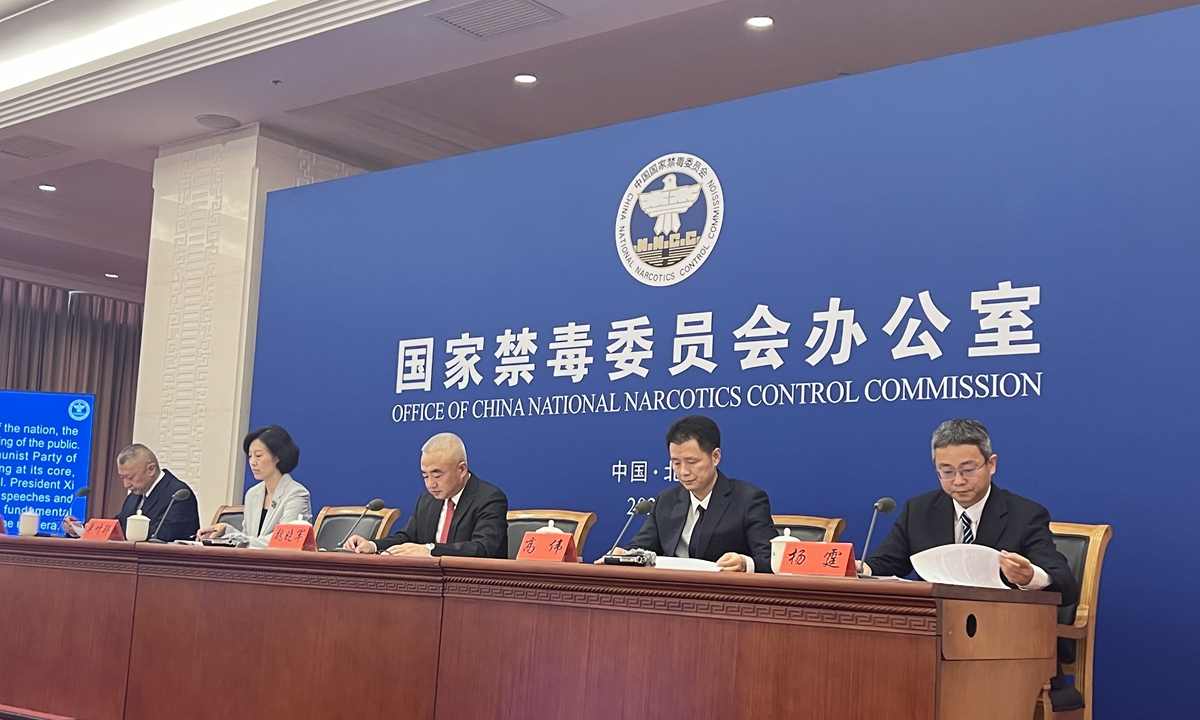
Photo of the press conference
The final scheduling of the US highly concerned specific fentanyl precursors will be completed through the relevant legal procedures in the coming months, according to officials from China's Ministry of Public Security's narcotics control bureau. The official said that over the past seven months, the interaction of the China-US narcotics control teams has been frequent and efficient.
Narcotics control teams between China and the US have been promoting substance scheduling, intelligence exchange, case cooperation, anti-money laundering involvement, technical exchange, cleaning of online advertising information, and cooperation in multilateral areas, Wei Xiaojun, head of the Ministry of Public Security (MPS)'s narcotics control bureau said at a press conference on Wednesday.
China is also actively working on the scheduling of types of fentanyl precursors that the US remains highly concerned about, Wei said. "I believe that the scheduling of these three fentanyl precursors that the US is concerned about will be completed within a few months through the necessary legal procedures, achieving the final outcome."
Currently, law enforcement departments in China and the US are conducting joint investigations into several key cases, and some cases have made breakthrough progress, Wei noted.
Following US tipoffs relating to drugs and money laundering, Chinese police launched an investigation into a case involving illegal foreign exchange transactions, the MPS revealed on Wednesday.
The investigation found that, since 2017, a suspect surnamed Tong started a car dealership in the United States and offered exchange services between Chinese yuan and US dollars. The operation later evolved into criminal activities including the illegal trading of foreign currencies.
Tong has already been arrested, and further investigations are underway, the ministry said.
The technical experts from China and the US have resumed regular exchanges. They have already held two exchanges online and offline in February and March, both of which have achieved good results.
At the end of this month, there will be a second on-site supervision exchange, and it is believed that through professional assistance, the ability of both China and the US to combat drug crimes can be effectively enhanced, said Wei.
China and the US also carried out the cleaning of online advertising information. Recently, China conducted a nationwide special governance actions and online cleaning actions for different types of substances and their future and prerequisites.
During the actions, a total of 14 network platforms were removed of illegal content, closed, or adjusted, 332 enterprise accounts were forcibly deregistered, 1,016 online stores were taken down, 14.6 million pieces of information were cleaned, and 10 zombie websites were closed. Various website platforms have set up decentralized devices, and the number of online advertising information for all chemicals has significantly decreased.
Narcotics control officials from both countries also held frequent exchanges over recent months. According to a news release issued by the Chinese Embassy in the US on Tuesday, during a meeting between Chinese Ambassador to the US Xie Feng and Rahul Gupta, director of the White House Office of National Drug Control Policy, last Friday, "the two sides had a candid and in-depth exchange of views on promoting counternarcotics cooperation between the two countries on the basis of mutual respect, equality and mutual benefit."
Recently, US officials claimed that small chemical businesses in China make precursor chemicals that are shipped to Mexico to produce illicit fentanyl. China says addiction and demand for the drug are US domestic problems.
In China, some small-scale family-owned companies engage in the resale of chemicals. They advertise online and sell various chemicals, including imported ones. Once we discover these activities, we immediately take action to stop them. Depending on the laws and regulations, we either warn and advise them to cease and delete the relevant information, or ask them to cancel their business license, said Wei.
If their actions violate the relevant laws, we will take criminal or administrative penalties against them. However, Wei said China has found that some entities and individuals operate websites or network platform servers in the US or other foreign countries. In this regard, we need cooperation from the US and other countries to jointly crack down on such activities.




